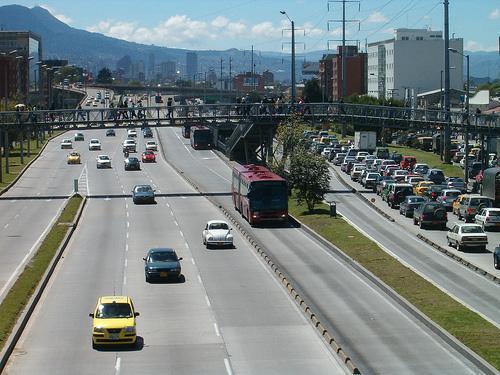Does “BRT double lane” refer to one 3.5m lane out of two, both together transporting 86k/hour due to leapfrogging efficiencies, or to both lanes together at 7m total? I think it’s important to maintain consistency with the 3.5m theme!
I would guess the former, as a single bus line usually doesn’t run a constant stream of buses nor express routes, but leapfrogging could allow you to run multiple bus lines along the same corridor, allowing for kinda ludicrous capacities.
Based on this data, the minimum headway and maximum current vehicle capacities, the theoretical maximum throughput measured in passengers per hour per direction (PPHPD) for a single traffic lane is some 150,000 passengers per hour (250 passengers per vehicle, one vehicle every 6 seconds). In real world conditions BRT Rio (de Janeiro, BRS Presidente Vargas) with 65.000 PPHPD holds the record, TransMilenio Bogotá and Metrobus Istanbul perform 49,000 – 45,000 PPHPD, most other busy systems operating in the 15,000 to 25,000 range.
Oh wow, I could believe that now! Tried looking up pics of Rio and Bogotá BRT to see if they are two-lane or one-lane. Some pics look as if it’s 2-lane:
But it seems that’s only around stations, the lanes merge into 1 later:
Wow, thanks for digging up some numbers on it. Those systems sure can move a lot of people. I certainly wouldn’t mind having buses show up every 6 seconds.
Does “BRT double lane” refer to one 3.5m lane out of two, both together transporting 86k/hour due to leapfrogging efficiencies, or to both lanes together at 7m total? I think it’s important to maintain consistency with the 3.5m theme!
I would guess the former, as a single bus line usually doesn’t run a constant stream of buses nor express routes, but leapfrogging could allow you to run multiple bus lines along the same corridor, allowing for kinda ludicrous capacities.
BRT Performance:
Oh wow, I could believe that now! Tried looking up pics of Rio and Bogotá BRT to see if they are two-lane or one-lane. Some pics look as if it’s 2-lane:


But it seems that’s only around stations, the lanes merge into 1 later:
Wow, thanks for digging up some numbers on it. Those systems sure can move a lot of people. I certainly wouldn’t mind having buses show up every 6 seconds.